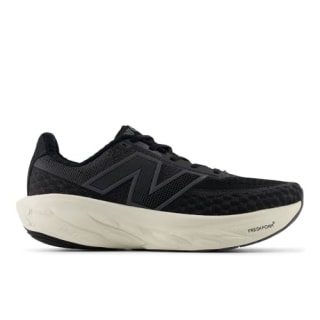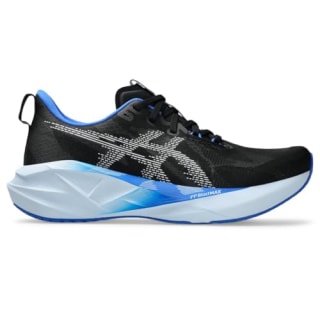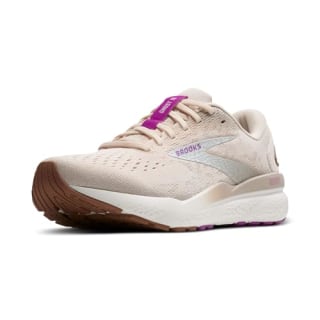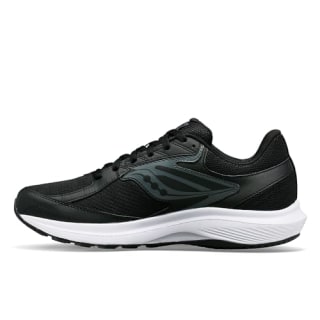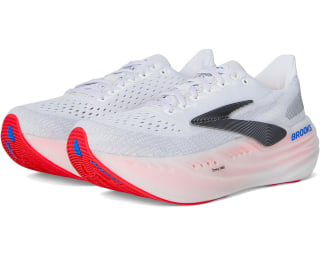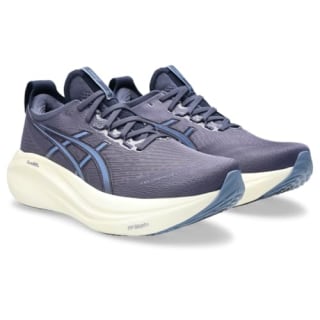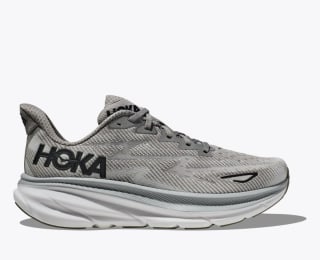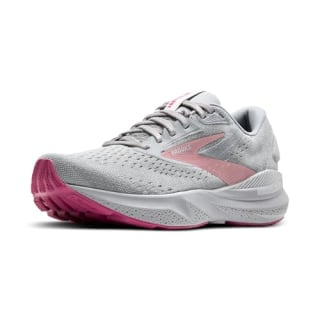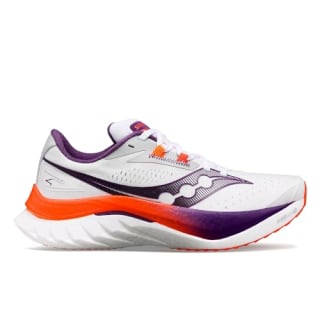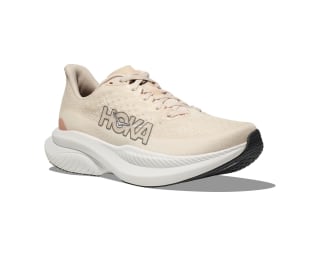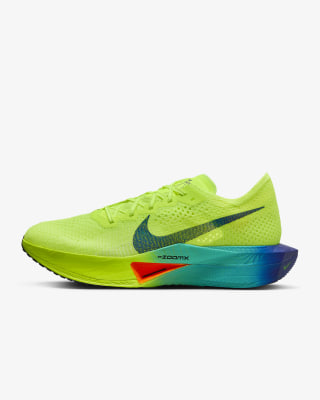Not all workout shoes are made the same. The best training shoes can make you more grounded and stable while lifting heavy weights. The best running shoes are made to make a marathon feel more like a mile. Pickleball shoes… you get the idea.
The team at NBC Select has raced in 5K, 10Ks, half-marathons and marathons. To find the best men’s running shoes on the market, I spoke with fitness and medical professionals to better understand what to look for. Then, I ran all over New York City in dozens of the top models.
SKIP AHEAD The best running shoes for men in 2025 | The best daily trainer running shoes | The best cushioned running shoes | The best supportive running shoes | The best tempo running shoes | The best race day running shoes | How to shop for men’s running shoes | Why trust NBC Select
Want more from NBC Select? Sign up for our newsletter, The Selection, and shop smarter.
How we picked the best men’s running shoes
There are hundreds of running shoes on the market from dozens of big brands. I spoke with experts to help narrow down what goes into the perfect pair.
- Size: Fit is the most important part of any pair of running shoes, according to our experts. That’s why I highlighted shoes with inclusive sizes and widths. I also included sizing information below each recommendation.
- Cushioning: A comfortable footbed, with a supportive insole and midsole, is another essential, says Dr. Miguel Cunha, podiatrist and founder of Gotham Footcare. The insole and midsole are between the upper and lower section of the shoe. Insoles made with memory foam or a shock-absorbing EVA (ethyl vinyl acetate) can help to support the arch and reduce impact on your joints.
- Price: Running shoes can be expensive. I included options across a range of price points between $65 and $260.
How I tried men’s running shoes
I have been running regularly as part of my fitness routine for the past five years. I live in New York City and typically run outside on pavement two to three times a week. My distance ranges between three and seven miles, and I use a fitness tracker to help guide my pace. I wear a size 10 shoe in a medium width, and generally prefer cushioned shoes with neutral support, as they mitigate knee pains more than other shoes I’ve tried.
To try new running shoes, I wear them for at least a week and follow my usual routine. I do at least one normal run, one tempo run and one long run to see how the shoes handle different speeds and distances.
The best running shoes for men in 2025
Our recommendations come from a mix of expert, NBC Select staff and personal recommendations from brands like Asics, Brooks, Hoka and Saucony. Each brand offers dozens of different models — this is not an all-inclusive list of every shoe you may (or may not) enjoy from these brands.
All our recommendations are road running shoes. You can find shoes for rough terrain in our guides to trail running shoes and hiking shoes.
The best daily trainer running shoes
Best overall: New Balance Fresh Foam X 1080v14
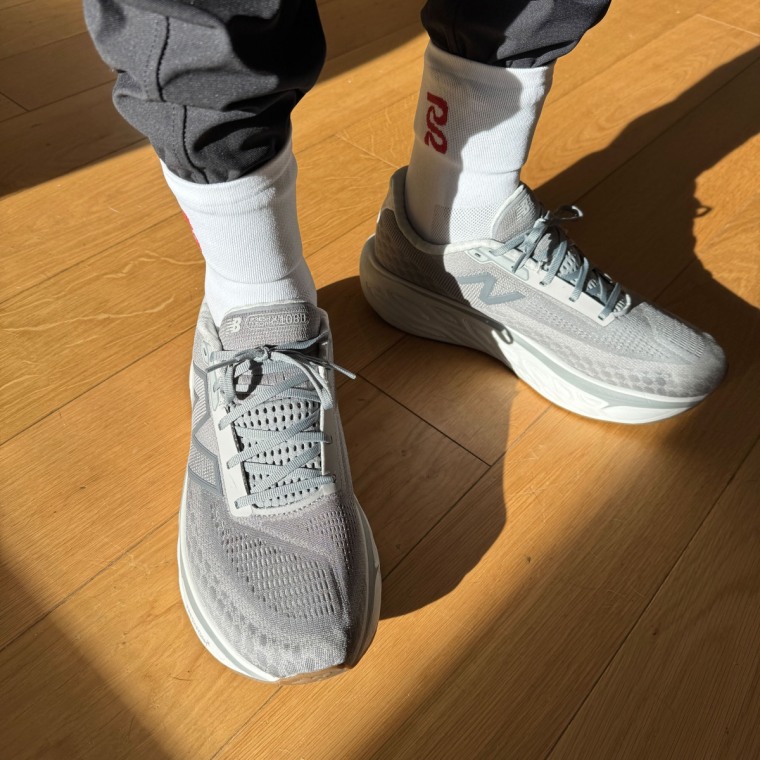
Multiple NBC Select staffers (myself included) love the New Balance Fresh Foam X series for daily running, walking and everything in between. NBC Select commerce editor Jordan Bowman wears this latest 1080v14 on most of his runs — the shoe strikes a great balance of comfort, cushioning, weight and speed. Though they are more cushioned than many daily trainers, they are excellent for running a casual pace over long distance and hard pavement. The slightly knobby tread on the outsole gives added confidence and traction on uneven surfaces and unpleasant weather.
Plus, the shoe has some of the most inclusive size and width options of our recommendations.
Sizes offered: 7-16 | Widths: narrow, medium, wide, extra wide | Heel drop: 6mm | Weight: 10.5 oz (298g)
Runner-up: Asics Novablast 5
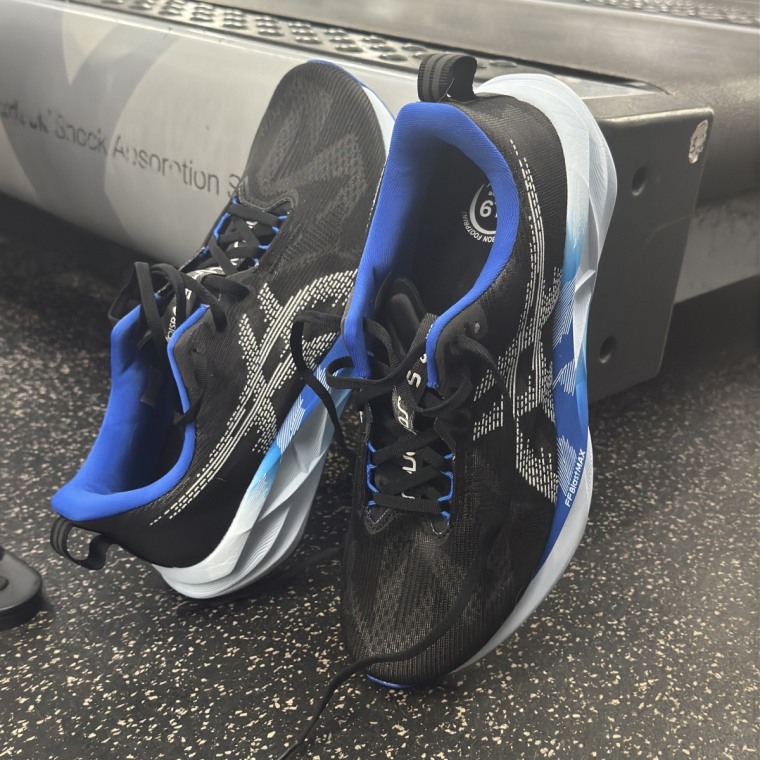
This model from Asics is more responsive and energetic underfoot than the very cushioned feel of the New Balance Fresh Foam, and is a great fit for all-around training at most paces. The shoe feels roomy enough to avoid pressure points and cushioned enough to handle longer runs without being so tall that they feel unstable. And like many Asics models, the back of the heel and top of the upper have fabric loops that make it easier to slip the shoe on.
Compared to the very cushioned New Balance Fresh Foam X 1080v14, I can feel the ground more as I run, primarily in the toe box, making it easier to push off for a burst of speed. However, there is a little straining depending on your distance and tolerance for repetitive impact.
Sizes offered: 6-15 | Widths: medium, wide | Heel drop: 8mm | Weight: 9 oz (255g)
Best for beginners: Brooks Ghost 16
I’ve worn a few different versions of the Brooks Ghost over the years, including the 16s. They are one of my go-to shoe recommendations for someone just starting to run, or anyone unsure of what they need out of their running shoes. They are well-balanced for all kinds of running — they have enough support to be comfortable, enough cushion to go the distance and enough toe box space to accommodate many foot shapes. Plus they come in four different width options and loads of colors.
Sizes: 7-15 | Widths: narrow, medium, wide, extra wide | Heel drop: 12 mm | Weight: 9.5 oz (269.3 g)
Best budget: Saucony Cohesion 17
If you are looking for a more affordable running shoe, Cunha recommends the Cohesion line from Saucony. They are comfortable, supportive, durable and provide great shock-absorption for every day running, says Cunha. They are the most affordable of all our top picks at around $65.
Sizes offered: 7-15 | Widths: medium, wide | Heel drop: 12mm | Weight: 8.5 oz (240g)
The best cushioned running shoes
Best overall: Brooks Glycerin Max
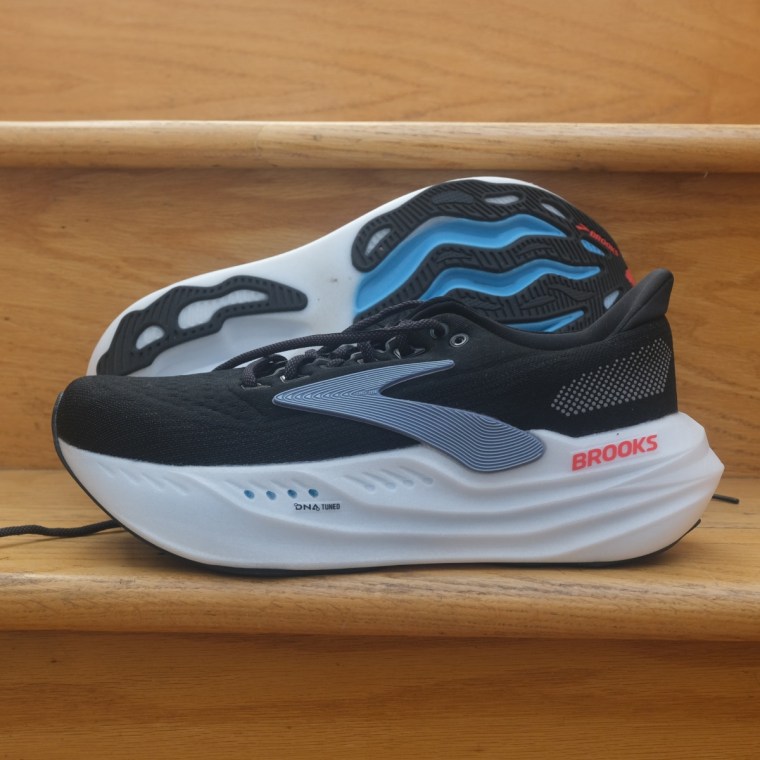
These are my favorite running shoes for relaxed, steady miles, especially on pavement. They are some of Brooks’ most cushioned running shoes, with a tall stack height to match — the shoes make me noticeably taller than others. Despite their cushion-focused design, they have a slight rocker-shape and decent energy return that makes them feel a little lighter than they actually are, in my experience.
These aren’t fast shoes — my mile times are slower when wearing these shoes versus lightweight tempo shoes. But I always feel comfortable and relaxed running in these shoes. The mesh upper is comfortable against the top of my foot, and the laces never accidently came loose during a run.
Sizes: 7-15 | Widths: medium | Heel drop: 6 mm | Weight: 10.5 oz (298 g)
Runner-up: Asics Gel-Nimbus 27
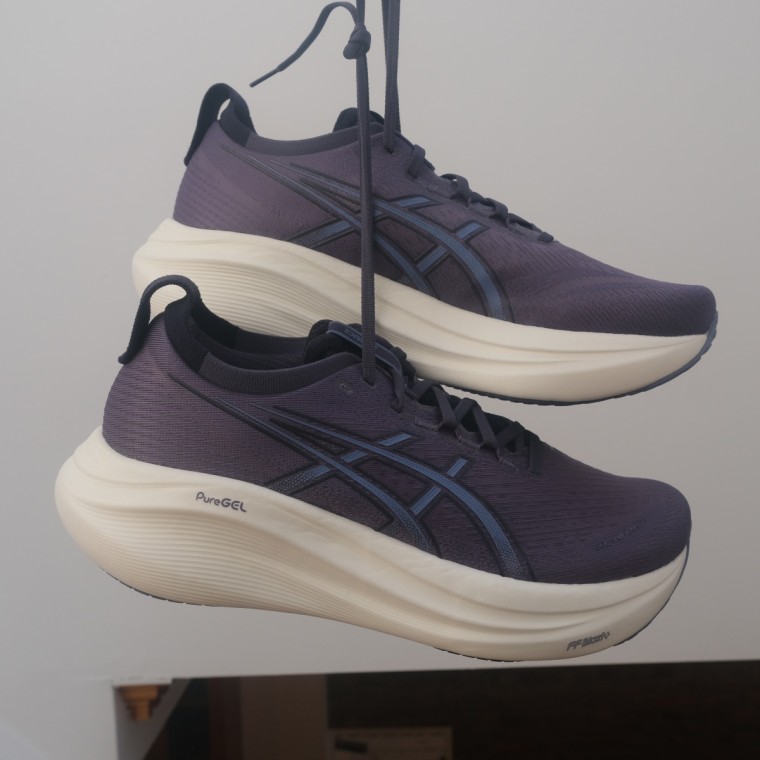
I rarely feel joint or knee pain running in these max cushion shoes, regardless of the distance. They are very comfortable at every touch point (all the places your foot contacts the shoe) thanks to the stretchy tongue, soft knit lining around the upper and extra padding around the ankle. Plus, there is an exterior loop near the heel that makes them easy to take on and off.
These are the heaviest shoes on our list. I wouldn’t recommend them for setting any personal records during a race, but for recovery runs or long, steady miles pounding pavement, these are a great option.
Sizes offered: 6-16 | Widths: medium, wide, extra wide | Heel drop: 8 mm | Weight: 10.8 oz (305g)
The best supportive running shoes
Best for wide feet and bunions: Hoka Clifton 9
These shoes come recommended by Cunha and are a winner from the 2023 NBC Select Wellness Awards. They are cushioned, chunky shoes with a spacious and wide toe box — Cunha recommends them for people with wide feet or bunions. The seamless elastic upper mesh reduces pressure and friction on bunions during runs, says Cunha.
While I do not have wide feet, the spacious toe-box was roomy and never scrunched my toes. They also weigh significantly less than our cushioned shoe picks.
Sizes offered: 7-16 | Widths: medium, wide | Heel drop: 5mm | Weight: 8.7 oz (246.6g)
Best for arch support: Brooks Adrenaline GTS 24
Cunha recommends the Brooks Adrenaline GTS 24 for anyone who needs reliable arch support. He points to the shoes’ EVA foam midsole, running from the heel to the front of the shoe. This midsole increases cushioning and adds pronation control, says Cunha. If you tend to roll your foot inward (overpronate) or outward (underpronate), this pronation control can help guide and balance your stride.
All Brooks GTS shoes have extra support around the rear of the shoe to reduce excess movement and help keep your stride natural and neutral, according to the brand. I’ve worn both Adrenaline and Adrenaline GTS shoes before. I found that the GTS version did help me keep a more natural stride.
Sizes offered: 7-16 | Widths: narrow, medium, wide, extra wide | Heel drop: 12mm | Weight: 10.1 oz (286.3g)
The best tempo running shoes
Best overall: Saucony Endorphin Speed 4
The Saucony Endorphin Speed series has long been a favorite tempo shoe for runners on team NBC Select, both men and women. They are the lightest non-race shoes on our list, and feel like it — they are light, fast and bouncy. The shape naturally rolls from step to step, encouraging a speedy pace — standing still or running slowly felt unnatural. Part of that speed comes from the winged nylon plate in the footbed, which delivers energy return without being quite as stiff as a carbon-plated race shoe.
Sizes offered: 7-15 | Widths: medium | Heel drop: 8mm | Weight: 8.1 oz (229g)
Runner-up: Hoka Mach 6
The Mach 6 is one of Hoka’s latest speed shoes, and has a new foam midsole and redesigned collar and tongue area. The tongue is thin and light, and sewn together in a way that wraps around your foot, helping it stay in place during bursts of speed.
These shoes strike a great balance between cushion and responsiveness — I feel fast, but not so connected to the pavement that every nook and cranny feels like a surprise. They seem a little more durable than the Endorphin Speed 3s, but have a relatively low heel drop of 5 millimeters that might not be for everyone.
Sizes offered: 7-14 | Widths: medium, wide | Heel drop: 5mm | Weight: 8.2 oz (232g)
The best race day running shoes
Expert pick: Nike Vaporfly 3
If you want to splurge on marathon-day running shoes, Cunha recommends these Nike Vaporfly 3. They are the lightest shoes on our list by far at 7.1 ounces, but don’t sacrifice durability and have a comfortable, responsive foam midsole, says Cunha. Inside is a full length carbon fiber plate, a common addition to race shoes that helps propel you forward and feels a bit stiffer underfoot.
Sizes offered: 6-15 | Widths: medium | Heel drop: 8mm | Weight: 7.1 oz (200g)
How to shop for men’s running shoes
There are hundreds of running shoes to choose from in the men’s section alone. Our experts highlighted a few essential things to keep in mind as you shop for your next favorite pair.
Try them on in-person
Both Cunha and Zach Moxham, a certified personal trainer at Physical Equilibrium in New York City, recommend going to a local running shoe store for the best fit possible. Specialty running shoe stores tend to have knowledgeable staff who can better inform you about running shoe options and recommendations, says Cunha. They also typically have more measuring tools to take advantage of, including foot scans, gait analysis and treadmill analysis — try everything and anything, says Moxham.
Fit is crucial
A poor-fitting running shoe isn’t going to be comfortable, no matter how stylish it may look.
If you plan to buy shoes in person, buy them at the end of the day when your feet are most swollen, says Cunha. That’s because if they feel comfortable when your feet are most swollen, they will likely feel comfortable throughout the day.
Cunha also says to try on at least three different models of shoe, even two different models at the same time, one on each foot, to get a good feel for the fit.
Pay special attention to the toe box — the area around your toes, says Cunha and Moxham.
“Make sure there is enough room to slightly wiggle your toes,” says Cunha. “If you can’t move your toes at all then the shoes are too tight and will eventually become painful. The tip of your thumb should fit between the end of the shoe and the end of your longest toe.”
Meet our experts
At NBC Select, we work with experts who have specialized knowledge and authority based on relevant training and/or experience. We also take steps to ensure all expert advice and recommendations are made independently and without undisclosed financial conflicts of interest.
- Miguel Cunha is a podiatrist and founder of Gotham Footcare in New York.
- Zach Moxham is a certified personal trainer at Physical Equilibrium in New York City and a certified training and running coach for Road Runners Club of America and New York Road Runners.
Why trust NBC Select?
I’m a reporter at NBC Select who covers technology and fitness including guides to fitness trackers, workout earbuds, cycling shoes and more. To better understand running shoes and their complexities, I spoke with fitness experts and medical professionals. I also tried over a dozen running shoes, incorporating them into my weekly fitness routine.
Catch up on NBC Select’s in-depth coverage of tech and tools, wellness and more, and follow us on Facebook, Instagram, Twitter and TikTok to stay up to date.


